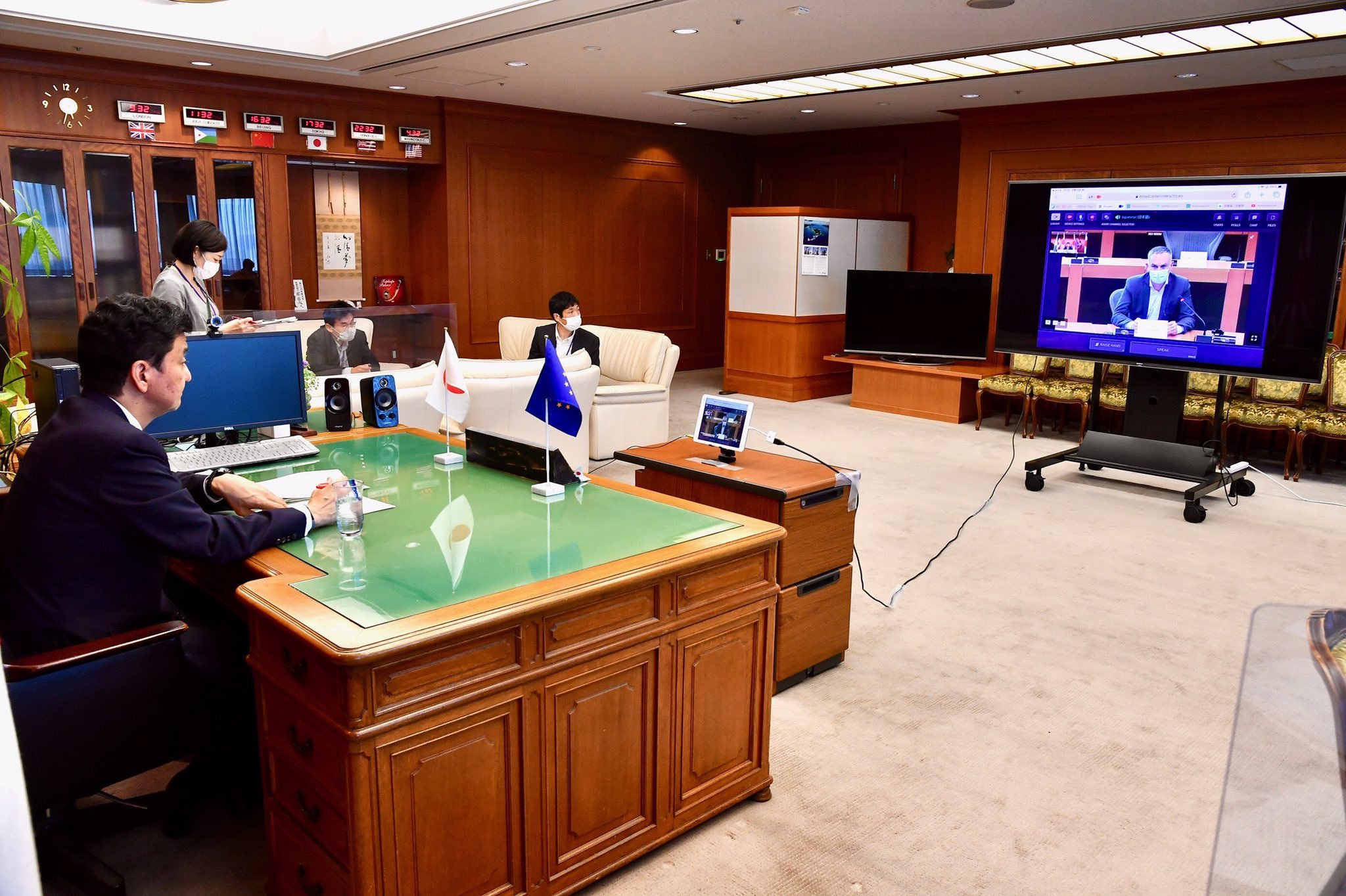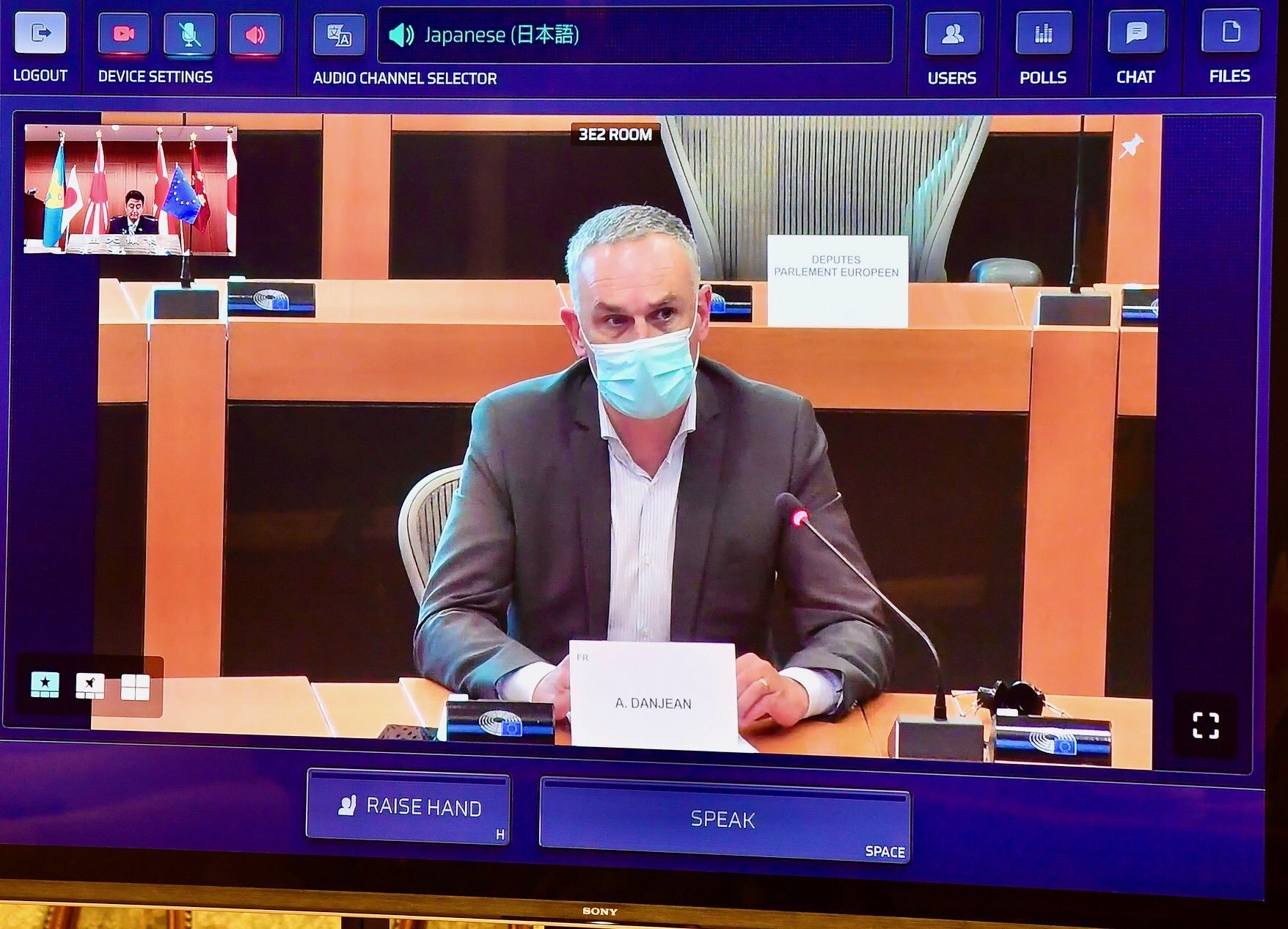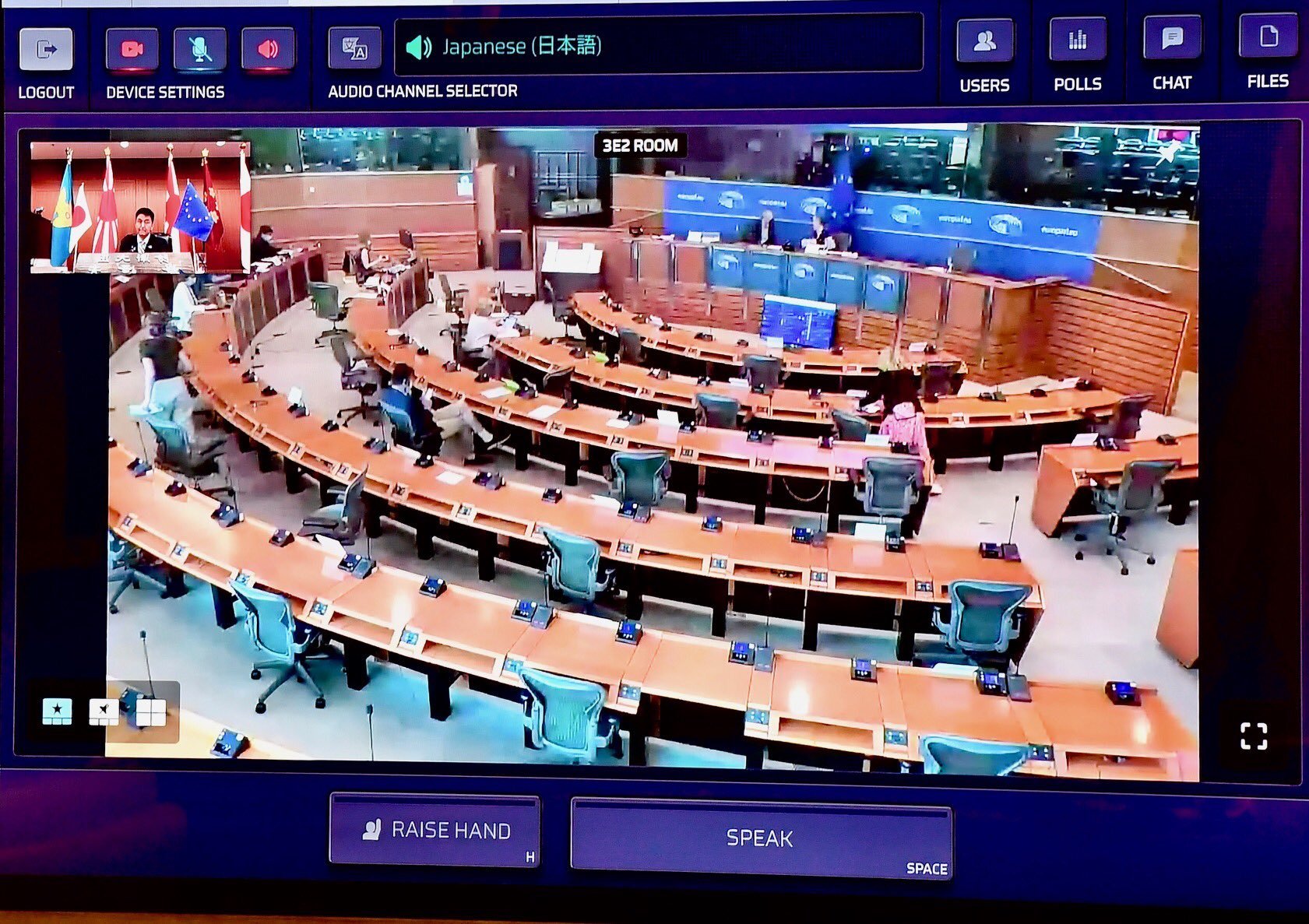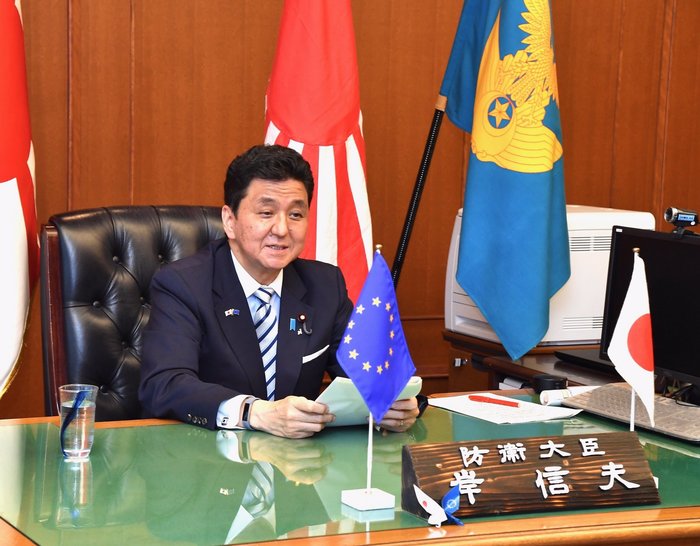On June 17, commencing at 5.00 p.m. (JST), DM Kishi attended the European Parliament’s Subcommittee on Security and Defence. DM Kishi gave a speech on this session. Referring to the reality of the security environment in Indo-Pacific region, he explained that Japan and EU nations are faced with a common challenge; unilateral attempts to change the status quo by coercion. In order to tackle the challenge, DM Kishi also emphasized the importance of Japan and EU nations’ confronting them together, that are sharing common values, and making our cooperation for maintaining and enhancing the vision of a “Free and Open Indo-Pacific” irreversible.



Defense Minister Kishi’s speech at European Parliament Subcommittee on Security and Defence (Provisional Translation)
I am delighted to be invited to the Subcommittee on Security and Defence today.
When I was the State Minister for Foreign Affairs back in 2017, I remember welcoming the SEDE delegation in Tokyo when Ms. Fotyga was the chair. I am happy that the seeds we planted at the time have bloomed into today’s occasion.
Ms. Loiseau, Ms. Schlademose, all distinguished members of the SEDE, please let me first state my appreciation for giving me this wonderful opportunity today.
The theme today is “Japan-EU Strategic Partnership: Trend and prospects for closer cooperation in the security and defense.”
Ever since the “Japan-EU Strategic Partnership Agreement” was provisionally put into place in 2019, Japan-EU cooperation in the security and defense field has made a giant leap.
I especially take special notice of the fact that within the EU, earnest discussions are taking place to establish a “Joint Communique regarding ‘EU strategy for cooperation in the Indo-Pacific, ’” which is expected to be made public this September.
EU shares universal values with us, and as Japan, we highly appreciate that EU is strengthening its involvement in the Indo-Pacific region. I pay my respect to all the sincere efforts made by each and every one of you.
After the SPA came into effect, Prime Minister Abe at the time visited Brussels where he used the analogy of the Japan-EU SPA being the guardian of universal values and the Japan-EU EPA the flag bearer, and said that if these two are put together into one ship sailing a vast ocean in the world, it can play the role as an stabilizer that can neutralize any kind of a shake.
Vast oceans cannot always be in a calm state, and the Indo-Pacific Ocean—a topic brought up at Cornwall this weekend with both Japanese and EU summit leaders’ participation—is no exception.
In order for the world to navigate this vast ocean, I believe that Japan and EU must play a role as a stabilizer and steer the way forward.
Hoping to serve for the ongoing discussions on your end, I would first like to share with you the reality of what is taking place in the Indo-Pacific region surrounding the security environment.
There are three points I especially want to elaborate:
One, the challenges we are facing in the Indo-Pacific region are the same ones you are also facing in the European region.
Two, in order to resolve such shared challenges, we—as those who share universal values—must align our strategic benefits and stand up together to face the challenges on a united front.
Three, how Japan is promoting a strategic security cooperation with like-minded countries and partner countries including those from Europe, based on a vision of a “Free and Open Indo-Pacific.”
Upon these three points, I would like to reflect on what we have achieved so far in terms of defense cooperation with Europe and EU, and finally, state my personal views on the vision going forward.
I hope that what I will talk today will serve to even further deepen your understanding on what is going on in the Indo-Pacific region in a realistic sense, and I can’t help but to wish that this would help your consideration process.
And I strongly expect that today’s opportunity will trigger Japan’s security cooperation with EU and with each individual countries of the European states to enter a “new level,” and that it will solidify EU’s commitment to the Indo-Pacific region to be an irreversible one toward upholding and enhancing a “Free and Open Indo-Pacific.”
When I talk about the situations surrounding the security environment in the Indo-Pacific region, there is no better place to start than the South China Sea, which is exactly where I will start off.
It is said that one-third of world trade and about 40% of European exports go through the South China Sea. Thus, the safety of the waters in this region is an issue of direct interest of Europe. In such South China Sea, we continue to witness “unilateral attempts to change the status quo by coercion.”
For example, China is continuing to militarize the contested landscapes in the South China Sea. China is building military facilities such as gun batteries, but not only that, they are developing infrastructures such as runways, port facilities, hangars and radar facilities which can be dually used for military means.
It has been reported that China could be rotationally operating patrol aircraft and early warning aircraft on those landscapes, and that anti-ship cruise missiles and surface-to-air missiles have been deployed there as part of their military training.
Apart from that, China is engaging in frequent military exercises, and has assumingly launched mid-range ballistic missiles.
These are examples of China escalating its behavior.
It has been, and will be Japan’s consistent position to support the rule of law in the South China Sea.
At the same time, we have placed emphasis on the “freedom of navigation and overflight” and “securing a safe sea-lane” and we have explicitly stated our will to outright object to the unilateral actions that raise the tension.
It is necessary that all relevant parties strive toward a peaceful resolution of conflicts based on international law including the UNCLOS.
Unilateral attemptsto change the status quo is continuing in the East China Sea as well, and last week,such serious concernssurrounding the East and South China Sea have been expressed at the G7 summit meeting.
The G7 summit communique explicitly sends out the message that it strongly opposes to any unilateral attempts that raise the tension.
Even up until now, China’s Coast Guard has tried to beef-up its vessels, both in size and regarding what arms to equip.
Moreover, the Coast Guard and the Chinese military is strengthening their collaboration on fronts such as organization, equipment and personnel.
Against such backdrop, the China Coast Guard Law that came into effect this time includes problematic stipulations in terms of consistency with the international law such as ambiguous maritime areas to apply and the authority of using weapons, which is something I have conveyed on numerous occasions.
The justified rights of all relevant countries should never be undermined due to the Coast Guard Law, and we can never tolerate anything that could heighten the tension on the waterssuch as East China Sea and South China Sea.
The Philippines and Vietnam—both littoral nations of the South China Sea—are raising their concerns and objections toward the Coast Guard Law.
As an effort on my end, I have conveyed such Japanese concerns to many countries including European states through the occasion of telephone and video conferences. And I have been able to share such serious concerns with countries like Ukraine, in addition to the US and Australia.
Reflecting upon such developments of China, there is no way I cannot NOT mention Taiwan, our friend. For Japan, Taiwan is an extremely important partner that shares fundamental values such as freedom, democracy, basic human rights and the rule of law. We have close economic ties and personal exchanges, and Taiwan is a close friend.
It goes without saying that the stabilization of the situation surrounding Taiwan is important for Japan’s security, but it is also important for a stable international community as well.
Against such backdrop, China is rapidly strengthening its military power, and thus, the military balance between China and Taiwan is overall trending in favor of China. The gap is widening every year, too.
With respect to the China-Taiwan relationship, it has been a consistent position of Japan to expect that it will be peacefully resolved through direct dialogues by relevant parties, and that it will serve for the stability of the region.
Such point has been referred to, both in the Japan-EU summit meeting last month and in the recent summit communique of the G7 Cornwall summit.
MOD will continue to keep a close eye on the trends that could be conceived as a shift in the military balance system in the region.
It is not only in the Indo-Pacific region that “unilateral attempts to change the status quo by coercion” based on unique assertionsthat are not in line with the existing international order are occurring.
Such attempts are equally happening in Europe as well.
And as you all very well know, “hybrid warfare” that intentionally blursthe military and non-military line is a tool used on some occasions.
Situation in Ukraine was also mentioned in the G7 joint communique last week.
Last March I invited Minister Taran—whom I believe was also a speaker at this committee before—to Japan for the first time and held the second-ever defense ministerial meeting with Ukraine.
On the occasion, I told him that Japan will consistently respect Ukraine’s sovereignty and its territorial integrity, and that we stand in a position to absolutely not tolerate the “unilateral attempts to change the status quo by coercion.”
What these examples tell us is that the challenges that threaten world order based on universal values that has supported world’s stability and prosperity is no longer regional challenges; we have to construe them as global challenges.
And in order to uphold international order based on rules, countries that share universal values mush act in solidarity.
To frame it in other words, countries such as Japan and EU must tackle together on the challenge of the “fight against authoritarianism.”
In such security environment, it is only a natural course for Japan and EU to further strengthen our bond.
As we aim to continue maintaining the peace and stability of the international community, we must make this trend an irreversible one.
As MOD/JSDF, under the vision of FOIP, we are promoting security cooperation in a strategic way, hand-in-hand with countries that share security interests and universal valuessuch as democracy and rules of law.
This vision of FOIP has three pillars, namely: 1) proliferate and embed the fundamental principles of the international community such as democracy, rule of law and human rights; 2) pursuit of economic prosperity through improved connectivity; and 3) initiatives for peace and stability including the maritime security.
Japan has been promoting this vision with countries in the Indo-Pacific region, and also with European countries including EU and NATO.
In doing so, as MOD/JSDF, we believe it important for every country to work together toward : 1) agree to absolutely oppose to “unilateral attempts to change the status quo by coercion;” 2) strongly contest any behavior to raise the tension; and 3) send out a clear message that an international order based on the rule of law is important.
Ever since I assumed the position as Defense Minister last October, I have accumulated such discussions on these points with many countries, including Minster AKK of Germany and Minister Parly of France.
Apart from that, I have had conversations with Minister Taran, whom I mentioned earlier, and also with defense ministers of the UK, the US, Canada, Australia, India, and with ministers from South East Asian countries and Middle East.
Also during the recent summit meeting, Prime Minister Suga conveyed to President Macron and Chancellor Merkel that Japan welcomes their commitment to the Indo Pacific region.
In December last year, I had a frank exchange of opinion with Chinese Defense Minister Wei Fenghe, and directly conveyed Japan’s strong concerns and the problems we see.
What Japan hopes now to maintain and reinforce the vision of FOIP is to further develop our relationship with EU as a strategic partner that we can act together with to establish world’s peace, security and stability, based on common values such as democracy and rule of law and principles.
In Europe, countries such as France, Germany and the Netherlands have released policy documents regarding Indo-Pacific, and they have shown explicit intention to be involved in the region.
And in April this year, EU, too, has announced its “Strategy to cooperate in the Indo-Pacific.”
What this strategy advocates is exactly in harmony with what Japan promotes in the FOIP vision. In particular, as Defense Minister, I highly commend on the point that the EU strategy sets out the strengthening of presence and action in the Indo-Pacific.
Such policiesset forth by European countries are also reflected in concrete actions.
JMSDF and EU naval units are both engaged in counterpiracy activities in offshore Somalia and the Gulf of Aden. Offshore Somalia and Gulf of Aden is a crucially significant sea lane for Japan and the international community that connects Europe and Asia.
Japanese and EU units have conducted 24 bi/multilateral exercises so far, and through those exercises, we have been preparing ourselves for anything that could happen in terms of counterpiracy.
Last month, there was a counterpiracy related exercise in which Djibouti also participated.
On the occasion, we issued a joint statement to expand the cooperation to otherlike-minded countries, and that we will “continue to commit to maintain a rules-based international order to strengthen prosperity through a peaceful and stable sea.”
The number of piracy acts in the areas of offshore Somalia and the Gulf of Aden have exceeded 200 times between the period of 2009 and 2011.
However, due to the consistent efforts made by the international community including Japan and EU, currently, piracy acts are trending at a low level.
But given that the fundamental problem of creating pirates, namely poverty in Somalia, has yet to be resolved, Japan will continue to work with the international community including EU and resolutely take part in counterpiracy measures.
On a related note, we are seeing a closer collaboration with each of the European nations.
Last month, we conducted a multilateral exercise called “ARC21” with France, US and Australia that involved training menus such as replenishment at sea (RAS) and landing ashore.
Not only were we able to demonstrate our resolution to protect our remote islands, but we were also able to show-off our solid collaboration between Japan and France in the Indo-Pacific to our domestic and international audiences.
Moreover, as an effort not to lose the momentum of the exercise, each of the Chief of Staff from Ground, Maritime and Air Staff Offices engaged in VTCs with their French counterparts and shared views regarding defense cooperation going forward.
And as I speak, a Dutch frigate “Evertsen” joining the CSG21 led by the UK aircraft carrier “Queen Elizabeth” is now on its way to the Indo-Pacific region including Japan.
I would once again take this opportunity to welcome the CSG21 including Evertsen’s visit to Japan.
Germany also announced the deployment of its frigate to the Indo-Pacific region this year, and Japan welcomes the initiative.
What these activities clearly point out is: 1) EU and the European countries’ will and capability to contribute to the peace and stability of the Indo-Pacific region; and 2) a robust solidarity with Japan that promotes FOIP.
And what we must never forget is that these activities are upheld by professionals, working far away from home and family, and persevering tough missions on a daily basis.
They are heroes that embody their home-countries’ commitment to the Indo-Pacific region. As Defense Minister of Japan, I would like to pay my utmost respect to those people, and express my heartfelt appreciation.
Right now, we are seeing with our own eyes that like-minded countries including Europe are boosting up their commitment and involvement for the peace and stability of the Indo-Pacific region.
It is my sincere hope that such involvement will continue and expand, and that many more will follow the lead.
On top of that, as we see more and more globalsecurity challenges coming to the surface that no one country can deal with alone, and cooperation in domains such as cyber and space is becoming increasingly important.
We also have to be aware of the fact that there are movements to expand ones influence through means such as disinformation and vaccine, taking advantage of the Covid-19 pandemic.
Bearing these situation in mind, I strongly expect that the Joint Communique will include a robust message to secure an unwavering commitment by EU and the memberstates, including the continuance and expansion of a tangible military presence in the region.
At the recent US-UK summit meeting, a “New Atlantic Charter” was unveiled, which advocates compliance to values that underlies rule of law and democracy.
I deem this as one symbol of gesture that is in line with the current international order and new security environment.
I expect that the “Joint Communique” to be adopted by EU will be a new standard of Indo-Pacific strategy that tackles the common challenges both Japan and EU face.
To borrow the words of former President of the EU Council Mr. Tusk, EU and Japan are geographically far apart, but there has never been a time when we are this close in the security field.
And the basis of this is the Japan-EU SPA.
In the SPA, Japan and EU declared that we share fundamental values such as democracy, rules of law, human rights and freedom, and principles.
Security environments change at a dizzying pace, but we have to contribute to peace and stability under a firm resolution to protect these values and principles at all costs. And we need to make those intentions clear by demonstrating and tangible actions.
Going forward, in order for FOIP and the EU’s new “strategy” including the Joint Communique to exercise a synergetic effect, I would like to work closely with Chairman Loiaseau, Ms. Schaldemose and all other present today, and proactively engage together for the peace and stability of the region.
Thank you for your time.
PressRelease.pdf


